When you read the Bible, you see stories of faith, prophecy, and miracles. But hidden between those lines are also lessons in survival. Especially when it comes to food.
From Joseph filling granaries before famine, to families drying fruit under the desert sun, people in biblical times relied on simple methods that worked without refrigeration, electricity, or supermarkets.
The same preservation techniques that sustained people thousands of years ago can still keep you and your family alive today. I’ve tried several of these myself, and they work.
They keep food safe, nutritious, and surprisingly flavorful. Let’s take a closer look at what the Bible teaches about preserving food—and how you can put those methods into practice now.
Drying / Sun-Drying
Biblical reference: “A land with wheat and barley, vines and fig trees, pomegranates, olive oil and honey.” (Deuteronomy 8:8)
In the lands described in the Bible, much of the harvest was dried for storage. Grapes were turned into raisins, figs were spread out to dry, and even strips of meat were cured under the hot sun. By removing moisture, they made food last long past the harvest season.
Today, drying is still one of the most accessible preservation methods.
Fruits, vegetables, and meats can be sun-dried, air-dried, or dehydrated near a fire. Without moisture, bacteria and mold have no foothold.
The benefits are huge: dried food is lightweight, compact, and stores easily in jars, bags, or sealed containers.
I’ve dried tomatoes and apples myself, and the result is both practical and delicious.
Long-Lasting Sun-Dried Tomatoes (Canning Method)
- 2 cups sun-dried tomatoes (fully dried)
- 1 cup olive oil
- 2–3 garlic cloves, sliced
- 1 tsp salt
- 1 tsp dried herbs (basil, oregano, or thyme)
- Optional: 1 tbsp vinegar or lemon juice (for extra preservation)
Steps:
- Sterilize jars and lids in boiling water for 10 minutes.
- Pack sun-dried tomatoes tightly into jars, leaving ½ inch headspace.
- Add garlic, salt, and herbs.
- Pour olive oil (and vinegar if using) over tomatoes until fully submerged.
- Seal jars and process in a boiling water bath for 15 minutes.
- Let cool, label, and store in a cool, dark place.
Properly canned, these tomatoes can last up to a year without refrigeration.
Sun-dried tomatoes are a tiny, shelf-stable powerhouse. In just ¼ cup (~35 g), you get 70–80 calories, 3 g protein, 2 g fiber, and a boost of vitamins C and K.
Packed with antioxidants and minerals, they support immunity, provide sustained energy, and are perfect for keeping you going when fresh produce isn’t available.
You can find more long-lasting recipes, including simple, cheap, and quick jerky or pemmican recipes, right here.
In my supply stash, I’ve kept a special spot for this long-lasting recipes book, because I know I’ll find plenty of ways to use my provisions and maximize their nutritional potential post-SHTF.
Salting / Brining
Biblical reference: “Season all your grain offerings with salt. Do not leave the salt of the covenant of your God out of your grain offerings; add salt to all your offerings.” (Leviticus 2:13)
Salt was life in biblical times. Beyond religious symbolism, it was essential for preserving food. Fish and meat were packed in layers of salt or soaked in brine to stop rot in the desert heat.
 Salt works by drawing out moisture, creating an environment where bacteria cannot thrive.
Salt works by drawing out moisture, creating an environment where bacteria cannot thrive.
That means salted meat, fish, or even vegetables can last weeks or months longer than fresh.
Another benefit: salt improves taste. If you’ve ever had brined pickles or homemade jerky, you know the flavor is intense and satisfying.
Stockpiling salt now gives you one of the oldest, most reliable, and most versatile survival tools.
Fermentation
Biblical reference: “And no one pours new wine into old wineskins. Otherwise, the new wine will burst the skins; the wine will run out and the wineskins will be ruined.” (Luke 5:37–38)
Wine, vinegar, and fermented foods were staples in biblical cultures. Fermentation transformed food, creating nutrients and probiotics that supported health when fresh produce wasn’t available.
Cabbage became sauerkraut, milk turned into cheese or yogurt, and fruits fermented into wine or cider.
Even today, fermentation offers a low-tech, high-value way to preserve calories and boost nutrition.
A crock of sauerkraut or a batch of apple cider can provide vitamins long after your garden stops producing.
I’ve made sauerkraut with just cabbage, salt, and a jar—it’s surprisingly easy and keeps for months.
That reminded me of a recipe that was actually a secret until recently.
This is a dish that vanished with the Incas over 600 years ago, and only recently NASA has revealed it.
For decades, they’ve been supplying it to astronauts on month-long space missions.
The Incas stored it in pit holes for up to 10 years, ate it year-round, and used it to survive a four-year super-drought that wiped out neighboring civilizations.
And the best part? You probably already have the ingredients in your kitchen. Discover the secret Incan recipe revealed by NASA—right here.
Storage in Sealed Containers
Biblical reference: “Joseph collected all the food produced in those seven years of abundance in Egypt and stored it in the cities. In each city he put the food grown in the fields surrounding it. Joseph stored up huge quantities of grain, like the sand of the sea; it was so much that he stopped keeping records because it was beyond measure.” (Genesis 41:48–49)
Joseph’s foresight saved Egypt from famine. His method was simple: gather surplus grain and keep it stored until the hard times came.
Today, sealed containers are still your best defense against spoilage, moisture, pests, and mold.
Grains, beans, flour, and rice can last for decades if packed in Mylar bags with oxygen absorbers or sealed in buckets and jars.
Think of Joseph’s strategy: store when times are good so you’ll be ready when times are bad. A few sealed containers now could mean the difference between hunger and survival later.
Smoking
Biblical context: While smoking meat isn’t named directly, offerings and roasted meat are described. “The meat of his fellowship offering of thanksgiving must be eaten on the day it is offered; he must leave none of it until morning.” (Leviticus 7:15)
Ancient cultures in the Near East often used smoke as a preservative.
Smoke from certain woods dries out meat, coats it with protective compounds, and deters insects.
For thousands of years, people used smoking to preserve fish and meat for travel or storage.
Smoking is still practical. A simple smoker can be built from a barrel, pit, or even a covered fire.
If you want something more advanced, yet remarkably effective and without complex technological requirements, learn how to build the oven that cooks without fire, fuel, smell, or smoke.
Cold-smoking adds flavor and preservation, while hot-smoking both cooks and preserves. In a grid-down world, smoked food is both safe and satisfying.
Honey as a Preservative
Biblical reference: “Eat honey, my son, for it is good; honey from the comb is sweet to your taste. Know also that wisdom is like honey for you: If you find it, there is a future hope for you, and your hope will not be cut off.” (Proverbs 24:13–14)
Honey was medicine and preservation rolled into one. Its natural antibacterial properties kept food safe.
Archaeologists have even found honey in ancient tombs that was still edible thousands of years later.
You can submerge fruits, herbs, or even nuts in honey to keep them preserved. It also works as a natural wound treatment and a sugar substitute for long-term storage.
Honey is a multi-use survival staple that belongs in every stockpile.
I recently learned from here that I can actually build my own beehive using jars.
Basically, I can harvest a honey jar straight from the hive myself.
I may not explain it as well as Ron and Johanna, but you can find the full step-by-step plan, complete with pictures, inside The Self-Sufficient Backyard.
Root Cellar / Underground Storage
Biblical reference: “Then their father Israel said to them, ‘If it must be, then do this: put some of the best products of the land in your bags and take them down to the man as a gift—a little balm and a little honey, some spices and myrrh, some pistachio nuts and almonds.’” (Genesis 43:11)
Ancient people understood that certain foods lasted longer in cool, dry conditions.
Underground storage, caves, or shaded areas served as natural “root cellars” to keep nuts, grains, and produce fresh.
Building a root cellar is one of the smartest off-grid investments. Even a simple pit lined with straw can extend the life of potatoes, carrots, onions, apples, and more.
Without refrigeration, an underground cache keeps your harvest edible deep into winter.
What I did, starting over a year ago, was build an underground bunker right next to my house.
That’s where I keep all my food supplies, along with tools, survival books, and other items I know I’ll need when things get tough.
The best part is that I managed to build it all by myself, without any outside help, just by following the instructions from here.
The Easy Cellar ended up costing me less than the phone in my pocket.
And the truth is… after SHTF, only one of them will actually give me shelter and access to the resources I need.
One Last Thing…
“But whoever drinks of the water that I shall give him will never thirst.” (John 4:14) – this is another verse I’ve always found deeply inspirational.
Water is the most precious resource for life. I love water, and I love knowing I have access to it. The thought of ever running out honestly scares me.
That’s why I recently decided to secure my supply with a solution that our brave soldiers use on some of the toughest frontlines.
The constant threat of supply lines being cut forced U.S. Army leaders to develop an alternative known as The Water Freedom System.
 It has been used under the harshest conditions, in arid battlefields where hydration isn’t just about comfort—it’s about survival, and keeping soldiers strong enough to fight.
It has been used under the harshest conditions, in arid battlefields where hydration isn’t just about comfort—it’s about survival, and keeping soldiers strong enough to fight.
Fortunately, the plans are now available to the general population. I found them here, for a price I consider tiny compared to the peace of mind they’ve given me.
As a bug-out option, I also keep what experts have called the portable infinite water bottle (it fits in a regular backpack), released to the market after NASA officially acknowledged the threat of a 100-years megadrought.
Final Thoughts
If you ask me, the lesson is clear: the Bible may be thousands of years old, but the survival wisdom within its pages hasn’t expired.
Drying, salting, fermenting, storing, smoking, sweetening with honey, and hiding food underground—these are strategies that worked for centuries because they were simple, effective, and reliable.
We live in times when many find it hard to survive by relying only on the bare essentials—living life the way God and the Bible have taught us from the beginning. One community that still manages to do this is the Amish. Discover their secrets in The Amish Ways Book and dive deeper through The Amish Ways Academy.
You may also like:
Prepping Projects From The Bible
Learn How to Stay Present at all Times and Find Hidden Truths (Video)
This 3500-Year-Old Powerful & Natural Cure Found in The Bible Treats So Many Diseases


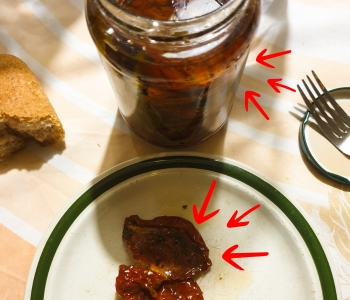
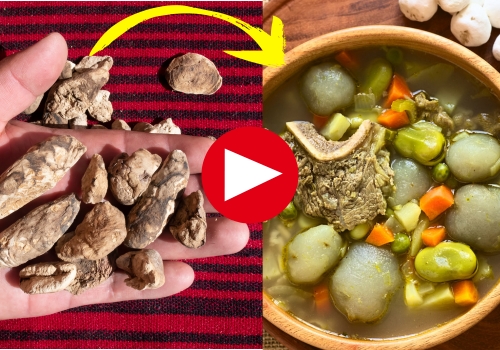
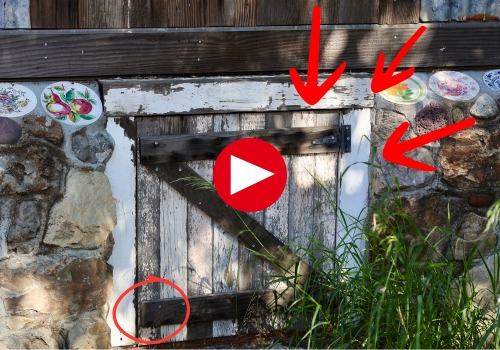







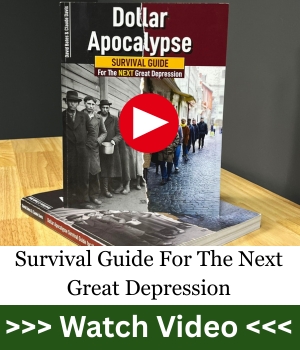



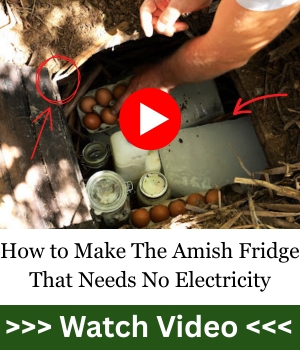








The bible, “the only book” that gives and thousands of years later, it seems to keep on giving.. nice…
There is “No other book” that gives the TRUTH, as the bible gives.
Theses recipes will be heavenly, am sure…
Love the bible in all it ways.
Thank you for opening the bible in a way that most never see it.
stay sharp
I couldn’t agree more. The Bible is full of wisdom that still guides us today, even in practical things like how to store food. Glad you enjoyed the perspective. Stay blessed and prepared!
Man it amazes me how many ways yall can keep reposting the same information we already know and is vastly shared on this site. Can we get some genuinely new information without another food preservation thing from the amish/native americans/settlers etc.
Titus
Hello. I due believe that there is one person out there that just heard about the lost ways Web site. So happy to see more info. The same but different in every way…
I like to keep reading about all the info out there even if it’s been done 10 different times.
Just sit back and enjoy the show.
Say you can also give out good sound info to some of us that have yet to hear from you about survival info.
Just waiting for you…
stay sharp
I get what you’re saying, but just to clarify, this is actually the first time we’ve put together an article specifically about biblical food preservation methods.
We always try to bring in new angles and perspectives, because different approaches click with different preppers.
The goal is to give you options so you can choose the methods that fit your situation best. Thanks for keeping us on our toes!
I would love to learn from the information you provide links to, e.g., the Inca food preservation method, but antivirus programs block them due to trackers on those sites you link to. For someone helping people with so many things, I would think you’d be more careful than to send us to websites with trackers. Please repair this faux pax.
Thanks for all of us.
Thanks for your concern! Just to clear things up: the link in this article goes directly to The Lost Ways 2, a well-known survival book. There’s nothing suspicious or harmful about it, and definitely no viruses.
Some antivirus programs can flag certain trackers on commercial sites, but in this case it’s safe to visit. We only share resources we trust and use ourselves.
I have such a short memory….all these article’s seem new to me…..
Haha, cheers!
Titus,
Ants words are wise, and to expand,
YOU can ask staff to write about a particular topic, Answer your questions, Etc.
AND you can dazzle us with your ideas, you can point out a missed point to ponder or suggest another way. IF you dont know, then its a good chance to research, ponder, reflect, and report back some of your new knowledge.
Also, read every ones post, expand on something they might have over looked, make helpful suggestions.
TO everyone, criticism comes EASY, but constructive criticism takes effort. Sharing knowledge, its best when it comes from all angles, so start sharing.
Well said. This community works best when we’re not just reading but sharing too. Every prepper has a piece of the puzzle, whether it’s experience, questions, or a different angle. That’s how we all get stronger together.